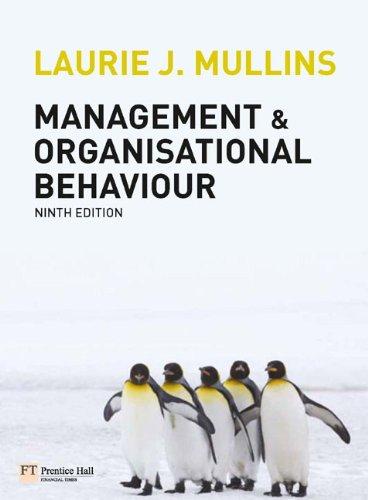Is the size of an employees waistline any business of the employer? The notion of companies concerning
Question:
Is the size of an employee’s waistline any business of the employer? The notion of companies concerning themselves with their employees’ lifestyles once seemed strange. But in the light of broader societal concerns about health, the role of employers in the provision of health care is more relevant than ever. The economist Julian Le Grand has even proposed that large employers should be legally required to ‘automatically enrol their employees in a weekly exercise hour, unless the employee chose to opt out’.
Two years ago, Unilever invited its UK staff to undergo confidential health screening to assess their fitness. Now the company has launched ‘Fit Business’, a year-long pilot programme to encourage its people – more than half of whom were revealed to be overweight – to eat healthily, become physically active and monitor their blood pressure, body fat and cholesterol levels.
In the US, some businesses require workers to lose weight, exercise or stop smoking as a condition of employment or to qualify for benefits. In the UK, participation in health programmes is voluntary and pressure on people to adopt healthy habits is less intense. One potential problem with workplace programmes is that some people worry about embarrassing themselves in front of fitter colleagues. Suggesting alternatives to formal exercise, such as taking the stairs and including walks as part of the daily commute, could be the solution, says Brent Pawlecki, corporate medical director at Pitney Bowes, the US-based postage services company.
As part of Unilever’s health initiative, it offers weight loss programmes. Participants receive a set of scales and a Bluetooth-enabled wrist monitor, which records how physically active the individual has been and links to an on-line coaching programme that generates follow-up advice. The company stresses that participation is voluntary and only the employee concerned sees any personal data. But should organisations reward employees for adopting healthy lifestyles? Sarah Brown, an employee benefits principal at the Mercer consultancy, says giving cash or goods to employees for completing on-line health assessments has been shown to improve participation rates. But, she says, not everyone is happy with a practice that imposes extra costs on the employer. ‘We get clients who ask: “Should we really be paying people to do something that’s beneficial to their health?”’
In terms of improving eating habits, removing pies and puddings from canteen menus is guaranteed to put people’s backs up. Pitney Bowes tries to nudge its employees towards health. It recently replaced potato crisps with carrots and celery as the default accompaniment to sandwiches, displays fruit instead of sweets by the check-out, and uses price subsidies to steer people’s choices. ‘The grilled chicken sandwich is a lot less expensive than the hamburger and fries,’ says Dr Pawlecki. That said, even he recognises there is a limit to the nannying employees will tolerate. ‘The cookies aren’t easily reachable,’ he says. ‘But there isn’t a hand that comes out and slaps you for grabbing them.’
Discussion questions
1. Should employers require their workers to take exercise and eat healthily as a condition of employment? What are the arguments for such a policy, and how do you think you would respond as an employee?
2. What role could be played by a human resource or personnel manager in support of a ‘healthy employee’ policy, and how could it be linked to other employment policies such as recruitment, pay, training etc.?
Step by Step Answer:

Management And Organisational Behaviour
ISBN: 9780273728610
9th Edition
Authors: Laurie J. Mullins, Gill Christy





